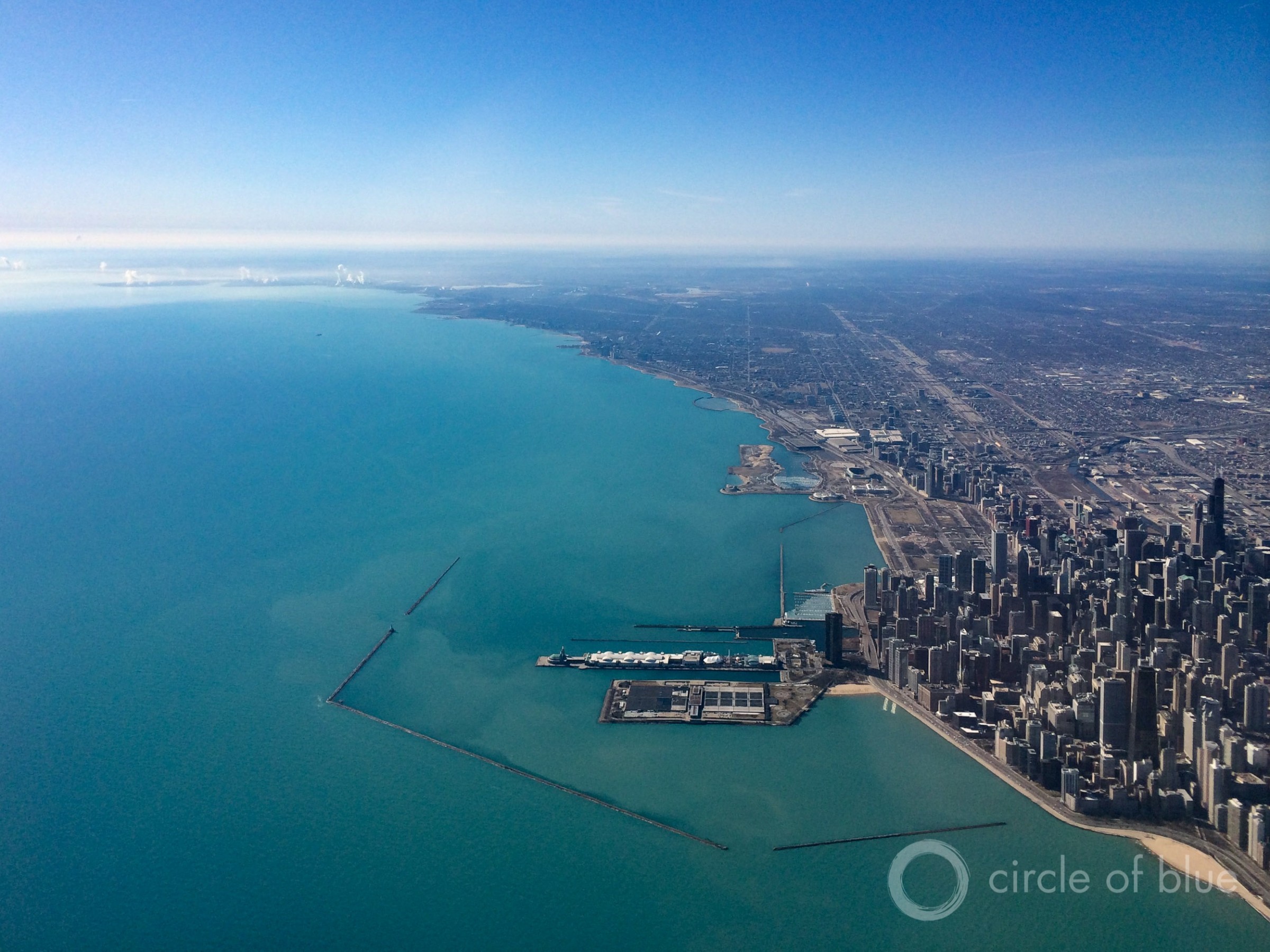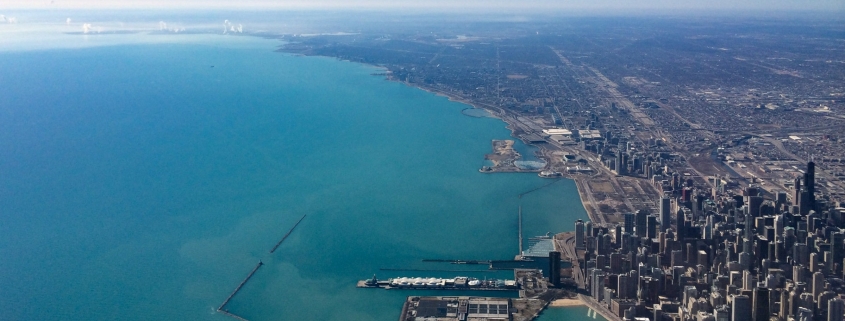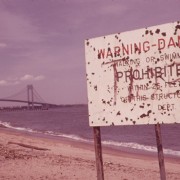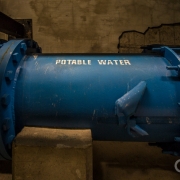Chicago’s New Mayor, In Rare Move, Considers Water Shutoff Ban
Few cities have complete bans on the practice. But some restrict when water can be turned off and which residents are eligible.

Chicago, the country’s third-largest city, draws its drinking water from Lake Michigan. Photo © J. Carl Ganter/Circle of Blue
By Brett Walton, Circle of Blue
Days before her inauguration last month as Chicago’s mayor, Lori Lightfoot made a forceful statement about her administration’s water policy. At an event at Malcolm X College, Lightfoot told her transition team that she would reassess city statutes for shutting off water service to households that fall behind on their bills.
“Water is a basic human right,” Lightfoot said on May 17, the Chicago Sun-Times reported. “And when you cut somebody off from water, you’re effectively evicting them and putting them on the street. We will not do that in the city. That is a heartless act.”
A month later, the new administration is still developing its water shutoff policy. Discussions between the Mayor’s Office, Department of Water Management, and Finance Department are ongoing, Patrick Kelly, the mayor’s spokesperson, told Circle of Blue.
The Department of Water Management, meanwhile, has a temporary moratorium on water shutoffs until a new policy can be finalized, Megan Vidis, a department spokesperson, told Circle of Blue.
Neither Kelly nor Vidis would provide any additional information about the deliberations, nor about the potential scope of the policy.
Addressing water shutoffs was a recommendation made by Lightfoot’s transition team, according to Josh Ellis, vice president of the Metropolitan Planning Council, a Chicago public-policy think tank. Ellis served on the transition team’s environment group.
The transition report states that within 100 days the administration should “restore water service to all disconnected homes an initiate progressive water rates, likely starting with a study.”
“I don’t know if there ever was an ‘a-ha’ moment or if it was anyone’s pet issue,” Ellis said, discussing the origin of the idea. “When it came up, there was near unanimous agreement that it was a high priority issue and we needed to do something about it.”
Chicago’s water prices more than doubled since 2010. Rates soared 25 percent between 2011 and 2012, then rose 15 percent a year for the next three years, as Rahm Emanuel, the former mayor, ramped up an infrastructure replacement campaign. A 2016 city law that tied rate increases to inflation tamed rate growth. But the following year Emanuel tacked a surcharge to water and sewer bills. Money from the surcharge will plug holes in the city’s pension fund.
A decade of financial pressures resulted in water rates becoming a “hot topic” in municipal policy, Ellis said. For members of the transition team, water shutoffs, by extension, were a natural target for action. They sat at “the intersection of environment, health, and equity issues,” Ellis said.
Identifying the Problem
For that reason — water being a basic need — shutting off service provokes strong reactions, especially when it is wielded against low-income households. But water shutoffs also reveal a tension inherent within water utilities, explained Alexandra Campbell-Ferrari, executive director of the Center for Water Security and Cooperation. The United Nations has elevated safe, clean drinking water to a human right, and California enshrined such a right in state law in 2012, obliging agencies to work toward that goal. At the same time, providing safe, clean drinking water costs money. Like cable or internet, it’s a service that requires payment.
If she were advising the mayor, Campbell-Ferrari said she would take a step back and define the problem. Who is not paying? Who is being shut off? If relatively well-off households are not paying, then shutoffs are an appropriate measure to secure the operating revenue that keeps the utility financially stable. If shutoffs are clustered in low-income areas, then that’s an argument for expanding water bill subsidy programs, she said.
“Lawmakers have to target the right problem,” said Campbell-Ferrari, who supports a ban on shutoffs for low-income households. “Otherwise you’re crippling utilities and endangering the safety of the infrastructure, and then no one gets safe water and sanitation.”
An investigation from APM Reports that was published in February found that shutoffs in Chicago were concentrated in poor and minority communities.
Few Precedents
An outright prohibition on residential water shutoffs, if that is what Chicago authorities resolve to do, would be an unusual outcome in the scope of American water utility policy. Aside from temporary moratoriums like in Detroit several years ago, few cities have endorsed such an encompassing move.
There is no national database that lists cities that prohibit water shutoffs. If there were, it would likely be short. Researchers who follow water utility policy could readily name few examples.
Campbell-Ferrari and her colleagues recently surveyed water shutoff and affordability policies for all 157 municipalities in Maryland. It was the most comprehensive survey of local-level statutes to date. They found only two municipalities — Bel Air and Oakland — that outlawed water shutoffs.
Though complete bans are rare, partial prohibitions that restrict the use of shutoffs against certain customers or during specific times of year are in broader use. California state law, for one, does not allow a utility to shut off water to households with a medical waiver. East Bay Municipal Utility District, which provides water to 1.4 million people in Oakland, California, and neighboring cities, does not shut off water to apartments, duplexes, and other multi-family housing. The utility instead adds a lien to the property, which can then be transferred to the property tax bill. “The intention is to shift the burden to the building owner,” Andrea Pook, an East Bay MUD spokesperson, told Circle of Blue.
The Philadelphia City Council prohibited water shutoffs in the colder months, between November 1 and April 1. The reason is to prevent households that use a radiator from being denied heat during winter, Joanne Dahme, a spokesperson for the Philadelphia Water Department, told Circle of Blue.
Instead of resorting to shutoffs, utilities ought to look at expanding customer aid programs, argues Laura Feinstein, a water policy researcher at the Pacific Institute.
“An effective affordability program is a more nuanced way of addressing shutoffs,” she told Circle of Blue.
Even in this direction there are hurdles. Financially struggling utilities might have too many customers who would qualify for a bill subsidy to shoulder an assistance program on their own. California is considering a state-run program for this reason. In other cases, state laws may bar public utilities from subsidizing certain customers.
Brett writes about agriculture, energy, infrastructure, and the politics and economics of water in the United States. He also writes the Federal Water Tap, Circle of Blue’s weekly digest of U.S. government water news. He is the winner of two Society of Environmental Journalists reporting awards, one of the top honors in American environmental journalism: first place for explanatory reporting for a series on septic system pollution in the United States(2016) and third place for beat reporting in a small market (2014). He received the Sierra Club’s Distinguished Service Award in 2018. Brett lives in Seattle, where he hikes the mountains and bakes pies. Contact Brett Walton











Leave a Reply
Want to join the discussion?Feel free to contribute!